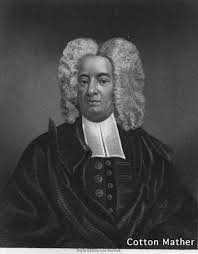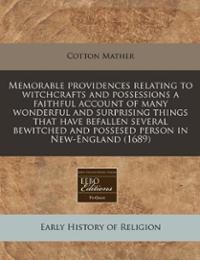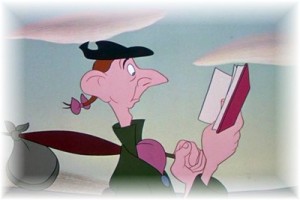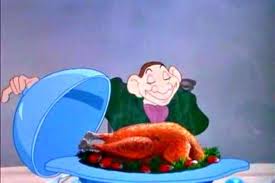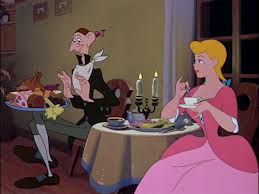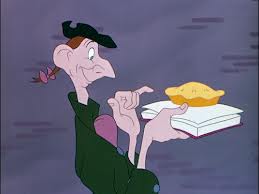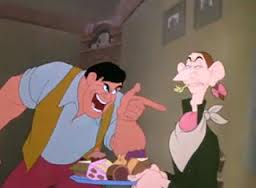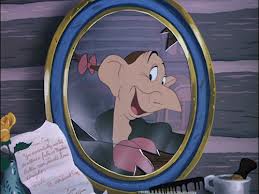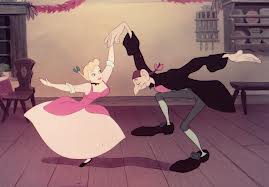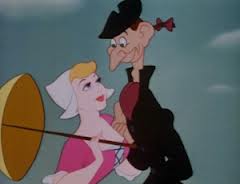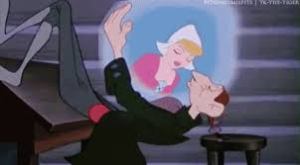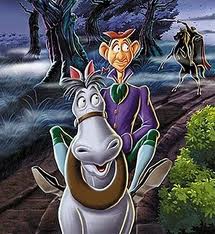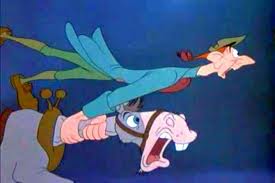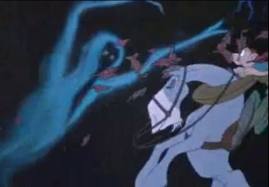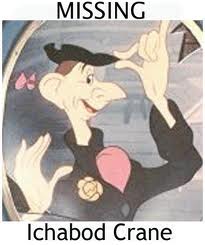How can we analyze “The Crane?”
Throughout “The Legend of Sleepy Hollow,” the narrator’s description of Ichabod Crane is less than positive and his descriptions of Ichabod allow for some close reading that can bring the true character of Ichabod to light. In many of his descriptions, the narrator is less than sympathetic; he is very sarcastic and judgemental of Ichabod. By the end of the story, the reader has a full conception of Ichabod’s identity (and it is not a very flattering one). Through the narrator’s descriptions of Ichabod, as well as the details of him we see in the story, we are able to analyze Ichabod. (Different ways of analyzing Ichabod are also apparent in Ichabod in Our Culture as well as on other parts of the web. A very detailed analysis of Ichabod as an anti-hero and as a representative the seven deadly sins can be found here.) Specifically, this page (Analyzing Ichabod) details the different facets of Ichabod’s identity. He is: paranoid/superstitious, gluttonous/a consumer, vain, “a lady’s man,” and cowardly/a fool.
Paranoid / Superstitious
“…for he had read several books quite through, and was a perfect master of Cotton Mather’s history of New England Witchcraft, in which, by the way, he most firmly and potently believed” (168).
Cotton Mather was a minister in the late 1600’s in Boston, Massachusetts and he wrote many books that fueled the Salem Witch trials. (For more information on Cotton Mather and his books click here.) Importantly, Ichabod not only reads books written by Mather that defend the Salem Witch trials, but he “firmly and potently believes” their contents, thus indicating his paranoia in the unknown. Disney’s film portray’s Ichabod as always with his head in a book. The short story does the same by mentioning Cotton Mather’s book on Witchcraft. The more Ichabod reads, the more he fuels his paranoia and superstition.
“What fearful shapes and shadows beset his path amidst the dim and ghastly glare of a snowy night! …. How often did he shrink with curdling awe at the sound of his own footsteps on the frosty crust beneath his feet; and dread to look over his shoulder, lest he should behold some uncouth being tramping close behind him!– and how often was he thrown into complete dismay by some rushing blast, howling among the trees, in the idea that it was the Galloping Hessian on one of his nightly scourings!” (169).
Ichabod is so paranoid, thinking that a ghost might approach him, that he does not even realize that he is being scared by his own footsteps. Such a ridiculous paranoia stems from a fear of the supernatural and the unknown, and leads Ichabod to be frightened by whom he believes is the Headless Horseman (but if he merely paid closer attention he would have seen Brom Bones on his horse, holding a pumpkin). This clip from Disney’s The Adventures of Ichabod and Mr. Toad shows Brom Bones singing the legend of the Headless Horseman. Ichabod’s frightened reactions to Brom’s song are comical, yet they also portray his deep seeded fear of the supernatural.
Gluttonous / Consumer
“The pedagogue’s mouth watered, as he looked upon this sumptuous promise of luxurious winter fare. In his devouring mind’s eye, he pictured to himself every roasting-pig running about with a pudding in his belly, and an apple in his mouth; the pigeons were snugly put to bed in a comfortable pie, and tucked in with a coverlet of crust; the geese were swimming in their own gravy; and the ducks pairing cosily in dishes, like snug married couples, with a decent competency of onion sauce” (171).
“As Ichabod jogged slowly on his way, his eye, ever open to every symptom of culinary abundance….and as he beheld them, soft anticipations stole over his mind of dainty slapjacks, well buttered, and garnished with honey or treacle, by the little dimpled hand of Katrina Van Tassel” (178-79).
Ichabod looks upon Balt Van Tassel’s farm in the first quotation and views the general land around him in the second quotation. However, Ichabod only views the farm animals and the land as providing him with his future meals. These descriptions portray him as gluttonous; he is always thinking about food and waiting in anticipation for his next meal. His gluttony blinds him to see the real nature of what is around him. Instead of seeing Balt’s farm, his animals and the beauty of the town’s landscape, Ichabod views only what he can gain from it: food. Essentially, his gluttony makes him greedy. He is a consumer, constantly taking things only for himself.
Watch the video under Paranoid / Superstitious again and while you watch it this time pay attention to Ichabod’s continual reach for food despite being scared. Within the first few seconds of the video Ichabod eats what appears to be a whole chicken in one bite! Throughout Brom’s song Ichabod reaches for coffee, jello, and other consumable items. His paranoia cannot even keep him from being centered on food.
Vain
“It was a matter of no little vanity to him, on Sundays, to take his station in front of the church gallery with a band of chosen singers; where, in his own mind, he completely carried away the palm from the parson” (167).
“The gallant Ichabod now spent at least an extra half hour at his toilet, brushing and furbishing up his best, and indeed only suit of rusty black , and arranging his looks by a bit of broken looking-glass that hung up in the school-house. That he might make his appearance before his mistress in the true style of a cavalier, he borrowed a horse from the farmer with whom he was domiciliated…and, thus gallantly mounted, issued forth, like a knight-errant in quest of adventures” (177).
By claiming that Ichabod’s singing is of better quality than that of the parson, the narrator is not stating a fact. Rather, he is stating Ichabod’s opinion. It is only in Ichabod’s mind that his singing is the best of the best. He falsely views himself as superior to others not only in singing but also in chivalry. The second quotation further suggests his vanity. The juxtaposition between the “broken looking-glass” and Ichabod’s “cavalier” appearance, as well as the gallant horse, is the narrator’s attempt to show Ichabod’s broken appearance. (The reader later learns that Ichabod’s appearance on his way to see Katrina Van Tassel is comedic more than cavalier.) Likewise, the pains Ichabod takes to look chivalrous and his belief that he can “win over” Katrina depicts his vanity.Unfortunately, Ichabod takes himself too seriously.
A Lady’s Man, or Just a One of the Ladies?
“Ichabod Crane had a soft and foolish heart towards the sex; and it is not to be wondered at, that so tempting a morsel soon found favor in his eyes; more especially after he had visited her at her paternal mansion” (170).
So far Ichabod’s weaknesses are as follows: the supernatural and food, lots and lots of food. Ichabod has yet another weakness: women. The quotation above depicts how easily Ichabod is seduced by women. In essence, the narrator portrays Ichabod as easily falling in love. Notably, the woman who catches his eye referred to as a “morsel” and is thus portrayed like the food that Ichabod consumes. In Ichabod’s mind, women are like food and to be used merely for his benefit. Also notable is that Ichabod falls for Katrina all the more once he views her father’s land, once again suggesting Ichabod’s desire to consume.
“Ichabod, therefore, made his advances in a quiet and gently insinuating manner. Under cover of his character of singing-master, he made frequent visits at the farmhouse;” (174).
Ichabod’s technique in courting appears in the above quotation. The reader discovers that Ichabod courts Katrina discreetly. However, his courting method does not simply come from his gentle manner, but from his fear of being discovered by Brom Bones, who is also courting Katrina.
The following video is of the Sleepy Hollow women swooning over Ichabod’s singing. It portrays how likeable Ichabod is to the women of Sleepy Hollow.
However, is Ichabod’s likeability due to him being a “lady’s man,” or does it come from something else? Is Ichabod more of a lady than a lady’s man?
“Another of his sources of fearful pleasure was, to pass long winter evenings with the old Dutch wives, as they sat spinning by the fire, with a row of apples roasting and spluttering along the hearth, and listen to their marvelous tales of ghosts and goblins…” (169).
David Greven, in his article “Troubling Our Heads about Ichabod,” states that Ichabod lacks “manliness” and is rather queer when compared to the other men in the novel, such as Brom Bones. In other words, Ichabod is represented as womanly. The above quotation declares that Ichabod finds pleasure in spending time with the old wives and joining them in their “feminine” activities: knitting, roasting applies and sharing ghost stories. Therefore, he is liked by the women of the town not because of his chivalry or his “marvelous” singing, but because he spends time with the wives in his free time. In essence, he is one of the wives.
Cowardly / A Fool
“Ichabod was a suitable figure for such a steed. He rode with short stirrups, which brought his knees nearly up to the pommel of the saddle; his sharp elbows stuck out like grasshoppers’; he carried his whip perpendicularly in his hand, like a sceptre, and, as his horse jogged on, the motion of his arms was not unlike the flapping of a pair of wings. A small wool hat rested on the top of his nose, for so his scanty strip of forehead might be called; and the skirts of his black coat fluttered out almost to the horse’s tail” (178).
This description of Ichabod on his horse comes directly after the reader is told of Ichabod’s efforts to look cavalier and chivalrous. However, the description does not remotely resemble a cavalier or a chivalrous Ichabod. In fact, he is described as the complete opposite. He is too big for his horse and merely looks awkward on it with his wide elbows and large legs. His nose is even so huge that his hat is able to cover it. The narrator’s comments on Ichabod’s appearance are an appropriate example of how the narrator regards Ichabod: he looks like a fool so he is a fool.
“It is true, an old farmer, who had been down to New York on a visit several years after, and from whom this account of the ghostly adventure was received, brought home the intelligence that Ichabod Crane was still alive; that he had left the neighborhood, partly through fear of the goblin and Hans Van Ripper, and partly in mortification at having been suddenly dismissed by the heiress; that he had changed his quarters to a distant part of the country;” (190).
Ichabod’s disappearance at the end of the story is the accumulation of Ichabod’s anti-hero behavior. Instead of defeating the Headless Horseman and winning Katrina from Brom Bones, Ichabod runs away. He does the exact opposite of what a hero should do. (Some would say that he was lifted away by supernatural spirits, but let’s get real here. Ichabod is much more capable of running away from a “ghost” through fear than actually seeing a ghost and being taken away by it.) Although he is our cowardly anti-hero, we remember him because of it. His disappearance, essentially stemming from his cowardly behavior, make him the real legend of Sleepy Hollow.
Importantly, Ichabod’s name is a clue to what really happens to him at the end of the story. According to Shmoop’s analysis of Ichabod, the name Ichabod first appears in the Bible. When the name Ichabod is used in the Book of 1 Samuel, it is glossed to mean “no glory.” Indeed the reader can find no glory in Ichabod in “The Legend of Sleepy Hollow.”There is nothing in Ichabod of which we can be proud. We laugh at his looks, despise his gluttony and are embarrassed by his actions. And Ichabod’s most cowardly action? His running away at the end of the story.
The clip below is from Tim Burton’s Sleepy Hollow and it is one in which Ichabod Crane (Johnny Depp) sees the Headless Horseman and immediately flees in the opposite direction.

